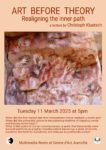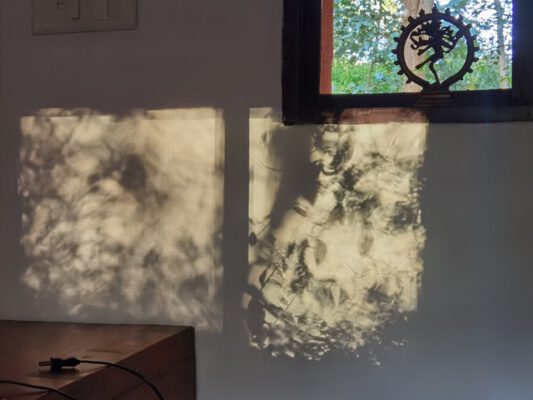Yesterday I had a long conversation about the origin of thought. What comes first, the words or the thoughts? Of course there are very different forms of thinking. A visual, musical, analytical, synthetic, performative thinking, etc… There is thinking on the level of intuition, there is thinking in memory, there is vision and inspiration. There are so many kinds of thinking. What is thinking? Who is thinking when thinking? How is it different from consciousness?
Much within my consciousness is not thinking, it is sensory perception, contemplation, daydreaming, there are unconscious and subconscious processes. All of this, strictly speaking, is not thinking. Thinking is an afterthought, it is a reflection on the world, it is an attempt to understand and comprehend the world. It is largely analytical. If I perceive something sensually, then first of all something is simply given to me within my consciousness. When I think about what I see, I give things names, I identify properties, I describe actions. This is my way of understanding the world. Describing the world in terms of an imagined text, allows me to see deeper connections: Modes of operation, causalities, principles….
But where does a thought come from? How did it come into being? There is intertextual thinking, i.e. I read or listen and respond to text with text, connect many texts… this is more academic. There is a thinking of active listening and communication. People who listen and think together explore a thought together. This listening and communicative thinking is exciting. Someone says something, someone else understands something, hopefully it coincides as much as possible because it will never be identical. Now, there are many dialogues here that are relatively standardized. Generalities are exchanged, or standard positions are compared, like in a chess game … but there is also the philosophical dialogue, the common questioning. The question, for example: What is thinking? How does one answer this question? How does one think about it?
Sensations and impressions
I was reading Deleuze essay on David Hume the other day. Hume says everything starts with ’sensation‘ or ‚impression‘. When I sense something and then name it, here is the beginning of thought. I can perceive objects, abstract properties, postulate causality, make statements, establish facts. But how can I record sensations and impressions? How can matter have a memory? How can my consciousness have images? These are the questions of Henri Bergson.
What is the relation between the external world and the images of consciousness, which then become thoughts structured in language? Doesn’t language have to be a priori already laid out as possible in order to express itself? Chomsky says our brains and perhaps those of animals have a general language capability baked into them. The Bible begins with: In the beginning was the Word. In the Vedas and Upanishads we find something similar. In the Vedas, however, it is not only language that was there in the beginning, but a whole system of knowledge that encompasses different levels of consciousness and understands man as a microcosm. Everything that I can think can also exist, and everything that exists can also be thought. Probably we need as a species there still many generations. But a correspondence is postulated between the world and the consciousness. They are one, nondual.
Deleuze thinking revolves around how thoughts arise from a level of immanence. How these thoughts connect and combine to form complex systems. He calls this, for example, abstract machines, diagrams, rhizomes, plateaus, etc… This is how words, thoughts, things, structures, power, art, the unconscious and the abstract, etc. can connect. The world thus expresses itself, in it there is life (A Life). This is at the same time the basic principle of the Upanishads, Brahman expresses itself through the creation of the world. An existence must also include the process and the change. This is the only reason why this reality exists.
Man has so far, as far as we know, created the most complex and wildest level of reality within thought. If you take all the different languages, cultures, religions, forms of society together, it becomes clear that something is being expressed here, something is manifesting. This is that.
Origin of thinking
So the origin of thought is only on one level in sensation. In spiritual practice, inner contemplation and habitual practice (meditation and yoga) are the key to an original thinking that frees itself from stimulus-response schemas. The scriptures and teachings, the rituals and practices, serve a self-forming that allows one to look beyond the surface of sensory certainty. The thinking that becomes possible here goes further than the mere recognition of causal connections. It also goes further than rational reflection on problems of ethics, aesthetics, and cognition. The rational mind has managed to initiate the Anthropocene, a terraforming that is unique as far as we know. Nevertheless, the existential questions remain untouched by this way of thinking.
So the question remains about the origin of thinking. Did the word stand at the beginning? The word stands for language, this can catch many things. If one understands language as a symbolic system, which can also be understood visually, musically or performatively, one could say that thinking itself is always language. But this only encompasses a small part of our existence. Our consciousness is wider, our physical existence, our life force (prana) our intellect (buddhi), memory (manas), our identity (ahankara) our spirituality (satchitananda), all this goes beyond thought. Thought can reflect and describe it, but it is not thought itself.
I always wonder what it was like at the beginning of thinking. Many thousands of years ago … I remember how we once wanted to bury a cat. Our (living) cat was irritated by the cardboard box. When the cardboard box with the carcass was gone, our cat performed a very elaborate ritual. We had never seen this before, although it is an older cat, and we have lived together for a very long time. It was clear that this was our cat’s reaction to the death of a conspecific. There are many stories from the animal kingdom, the elephant graveyards are perhaps the best known. It seems to me that a consciousness that remembers others is present here.
Thinking is rooted in experience, language, insight. Often it is an experience of the world that is beyond empiricism. This is where everyone’s true creativity lies. Thinking is also always a bit of an act of creation.











